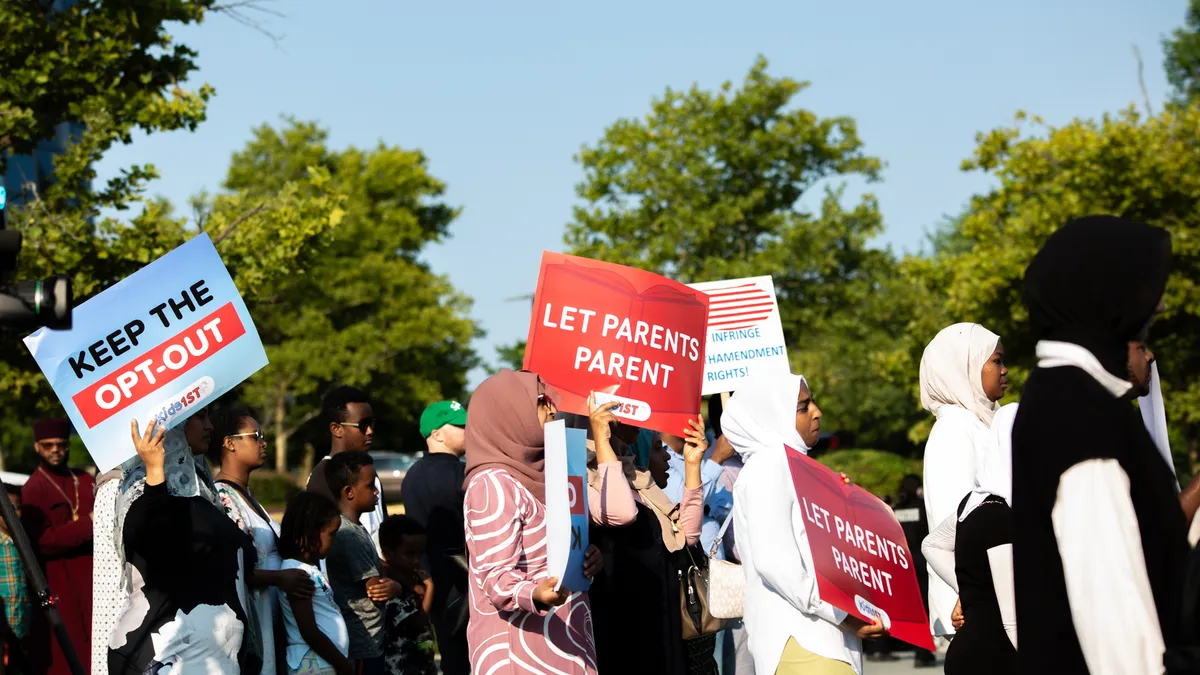Dive Brief:
-
Muslim, Christian and Jewish parents from Maryland last week asked the U.S. Supreme Court to decide whether districts violate their religious First Amendment rights when schools don't provide notice or a way to opt out of curriculum related to gender and sexuality.
-
The ability for parents to raise their children according to their beliefs is especially important for youngsters in pre-K-5 and those with special needs "who are highly impressionable and instinctively trusting of authority figures like teachers," the parents claim in their Sept. 12 petition to the high court.
-
Multiple parents involved in the case say they felt compelled to remove their children from Maryland's Montgomery County Public Schools, which walked back its original decision allowing parents to opt their children out of reading books related to LGBTQ+ experiences beginning in the 2023-24 school year.
Dive Insight:
Unlike other lawsuits related to districts' book ban policies, which apply to large groups of students, the Mahmoud v. Taylor lawsuit brings into question whether parents should be allowed under the First Amendment to remove their child from instruction they say goes against their religious beliefs.
Not being able to do so, they say, violates "parents’ right to protect their children’s innocence and direct their religious upbringing."
Lower courts have sided with Montgomery County Public Schools.
In May, the 4th U.S. Circuit Court of Appeals denied parents' request to pause the district's opt-out policy as the court case continues, saying the district's language arts curriculum introduced in 2022-23 does not impact how parents practice their own religious beliefs or impart them to their children. For example, the district did not ask parents to affirm views they disagreed with on gender or sexuality.
Maryland is among the majority of states that require parental opt-outs for certain health education subjects.
Originally, Montgomery County had allowed parents to opt their children out of the language arts curriculum. However, it walked back that decision after “individual schools could not accommodate the growing number of opt-out requests without causing significant disruptions to the classroom environment” and the “unworkable burdens” that high opt-out volumes put on educators, according to court documents.
As a result, petitioners claim, parents removed from the school district one student with Down syndrome and attention deficit disorder who was "particularly impressionable" to the contents of the books, costing them $25,000 a year in therapy, academic services and supplies they had to seek outside of the public school system.
The Supreme Court will consider during its next term — which begins in October — whether it will hear the case.
The justices receive 7,000 to 8,000 petitions of certiorari each term, out of which they choose about 80 to hear.
The court is already set to hear two education-related cases in its upcoming term, one on federal E-rate reimbursements to schools and libraries, and another on exhausting administrative appeals processes prior to filing state or federal lawsuits, which could impact the K-12 sector in areas like special education.












